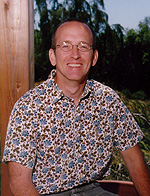Daniel Harder, director of the UCSC Arboretum, received a flurry of media attention after he weighed in on a controversial state plan to eradicate the light brown apple moth (LBAM) using aerial spraying of a pheromone treatment. According to Harder, eradication of the introduced pest may not be possible and is probably unnecessary.
Native to Australia, LBAM feeds on a wide range of plants and was first detected in California in 2006. When the moth was discovered on the Central Coast in 2007, Harder was concerned about its potential effects on the Arboretum's plant collections. The UCSC Arboretum maintains an extensive assemblage of plants from Australia and New Zealand, as well as other southern hemisphere plants and California natives.
In January, Harder and Jeff Rosendale, a Watsonville nursery owner, traveled to New Zealand, where LBAM was introduced more than 100 years ago, for a three-week fact-finding study. They found that it is considered a minor pest there and does not cause economically significant crop damage or harm native plants.
"It's not that bad a pest in New Zealand," Harder said. "It is effectively controlled almost exclusively by natural predators in both agricultural settings and wild lands."
A report by Harder and Rosendale was posted last week on the web site of State Assemblymember John Laird, one of several Bay Area legislators who have introduced bills to address the LBAM eradication effort.
Harder's findings were the subject of news stories in the San Francisco Chronicle, Santa Cruz Sentinel, San Jose Mercury News, Monterey Herald, and Salinas Californian. He also fielded calls from Bay Area radio stations KCBS, KRCB, KSCO, and KUSP.
Contact the author at stephens@ucsc.edu.



